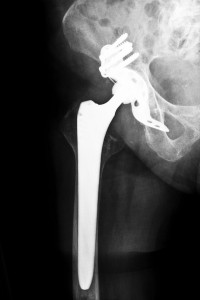Patients with metal-on-metal hip replacements in Mississippi may face an increased risk for certain types of cancer. Hip replacements allow people to remain active and independent far longer than their own joints can in many cases. Joint replacements in general are one of the marvels of modern medicine. However, sometimes things go wrong and Mississippians pay the price.
Types of Hip Replacements
 Metal-on-metal hip replacements in Mississippi are only one of the options out there. Joint replacements are made from three main materials that share the qualities of being fairly inert, strong and durable. They are metal, ceramic and plastic, either alone or in combination with one of the other options.
Metal-on-metal hip replacements in Mississippi are only one of the options out there. Joint replacements are made from three main materials that share the qualities of being fairly inert, strong and durable. They are metal, ceramic and plastic, either alone or in combination with one of the other options.
Metal-on-metal or MoM devices are named for the fact that the joint involves both a ball and socket made from metal. They were designed to be more durable and hold up to the longer and harder use required by younger patients. However, they seem to have several unexpected and potentially serious downsides.
MoM hip replacement implants have parts that rub against each other when the person moves. This friction releases tiny pieces of metal. Although metal implants within the body are largely inert, these individual ions are not. Large amounts of metal in the local area can cause reactions such as pain and inflammation, and large amounts of metal in the body can cause systemic reactions such as skin rashes.
This reaction is often referred to as metallosis, and appears to be more common with MoM hip replacements than other types. Because heavy metal poisoning is known to be a factor that can contribute to cancer risk, some people have wondered if this means that patients are at an increased risk for certain types of cancers. One British study seems to have evidence that it does.
Cancer Risk Patients with Metal-on-Metal Hip Replacements in Mississippi
The British study involved patients from Scotland who received a hip replacement between 1990 and 2009. It looked for increased incidences of cancers beyond the usual background risk for people in similar demographics. What it found has scary implications for Mississippi patients with MoM implants.
A general increased risk for all types of cancers could be present in those with metal hip replacements in Mississippi, the study authors wrote. This risk could be as high as 5 percent over the risk for individuals without this type of implant. Certain cancers are also more prevalent in MoM patients, including basal cell carcinoma, cutaneous melanoma and prostate cancer. Previous studies have seen increased risks for other organ cancers as well, such as kidney and bladder cancers.
MoM Implants Recommended Against by the FDA
As if all of the side effects weren’t bad enough, it appears that MoM implants don’t even do what they are supposed to. Instead of lasting longer and failing less often, MoM implants appear to fail much more quickly than they should. The FDA has even warned patients that they should be cautious in choosing an MoM implant and discuss the pros and cons carefully with their doctors.
Although metallosis is also on the FDA’s radar, their current recommendation is for Mississippian patients without symptoms to take no action. However, once symptoms arise, the levels of metal in the blood can be extremely high. Worse, the tests for metal in the blood are not as accurate as anyone would like. MoM implants may have initially seemed like a good idea, but they have turned out to be anything but. If you have been the recipient of such metal-on-metal hip replacements in Mississippi and wish to know your rights, contact Attorney Group for Mississippi today.





